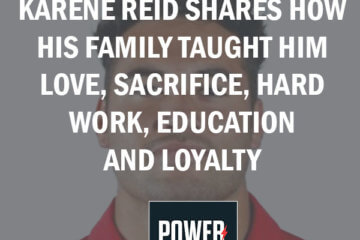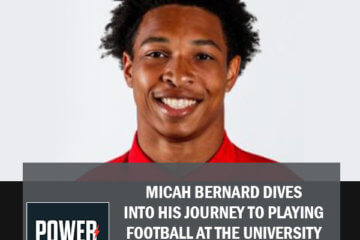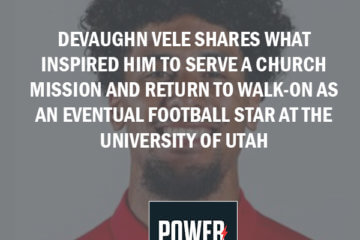Listen to the Podcast Here:
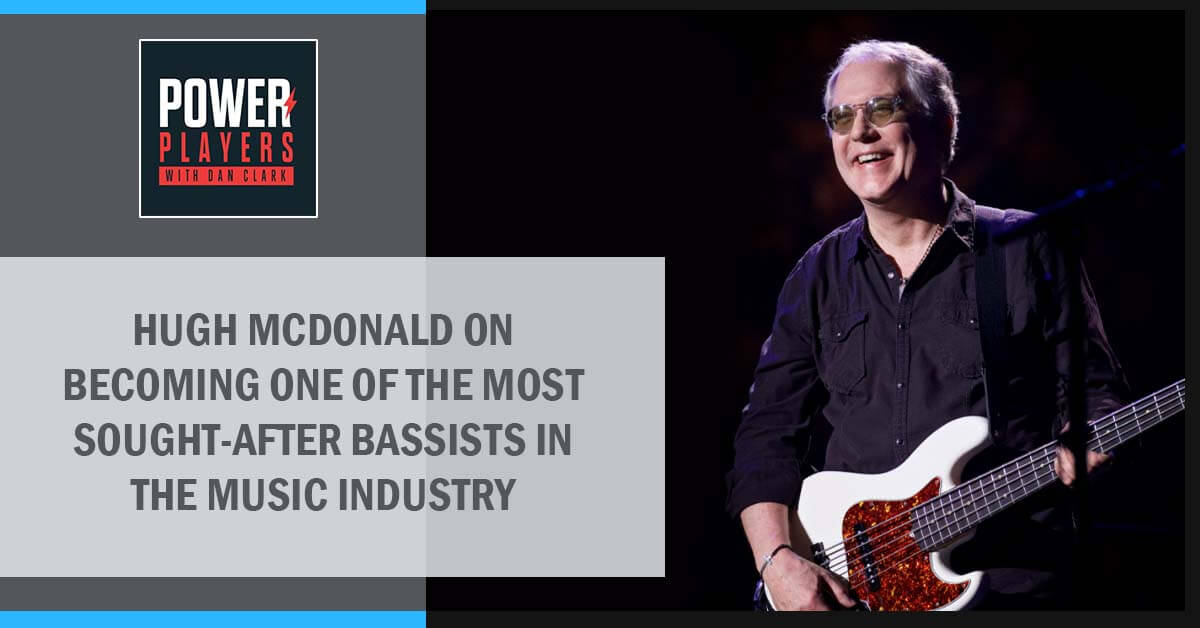
In this episode, Hugh McDonald, the bass player in the mega rock band Bon Jovi, explains the road warrior world of a rockstar, rehearsals, and performances. He explains to Dan Clark how and why he became one of the most sought-after bassists who have played on countless albums for the biggest names in the business! Hugh talks about how he met Bon Jovi, his favorite Bon Jovi song, and the time they performed at Hyde Park in front of more than 90,000 people. He also shares the other artists he had fun working with, the secret in keeping a band together, the process of recording an album, and his essential preparation and practice rituals.
—
Hugh McDonald On Becoming One Of The Most Sought-After Bassists In The Music Industry
Hold onto your seat for all of you who understand the significance of music. It’s truly the international language as Trisha Yearwood famously says, “It’s the song that remembers.” When we all have a favorite song, a favorite band that’s connected to a moment, to a significant emotional event, a wedding, first kiss or whatever the case may be. My guest is Hugh McDonald. He’s an American musician. He is best known for his unmatched session work and for being the bass guitarist for the American rock and roll band Bon Jovi.
His work with the band earned him a 1995 Metal Edge Reader’s Choice Award for best basis. That’s pretty incredible. Guitar players and vocalists are found diamond dozen but when you go into a recording studio or recording session or when you’re assembling a band, the single most important person in that band is the bass player and the second is the drummer, the percussionist. That’s how significant a bass player is, as he is the one that keeps the beat.
He keeps the entire band glued together. He’s the one that slows him down or speeds them up when they need that direction. That says a lot about Hugh’s personality and his life. Hugh has played with many other artists, both live and in the studio with Willie Nelson, Richie Sambora, Steve Goodman, Ringo Starr, Lita Ford, Michael Bolton, Alice Cooper, Ricky Martin, Gavin Whittaker, Michael Bublé, Bret Michaels and Shania Twain. No bass player has a complete resume without Shania Twain.
In 2018, Hugh was inducted into the rock and roll hall of fame as a member of Bon Jovi. I don’t want to break hearts again but in 2004, Hugh McDonald broke millions of women’s hearts across the world when he married his beloved Kelli, who’s a wonderful horse trainer and jewelry designer. They have two children. Hugh McDonald, what an honor, what a treat. Welcome to my show.
It’s great to be here.
Let’s start right out of the shoots. I love hanging around with musicians because you’re the smartest people in the world. You can see a buffalo and a blue cloud in the sky. You have a unique way of looking at life. Take us back to your beginning. Where did you grow up? How did you find your passion for music, especially playing the bass guitar, which is so significantly important to every single band and song?
Surround yourself with people that play better than you do. That will raise you up.
The reason is The Beatles and Ed Sullivan are one of the hundreds of thousands of aspiring musicians that saw that and it clicked. McCartney was the guy and it was the bass. I found myself in the basement of my parents’ house, playing along with the broom left-handed. That’s how it all started. I’ve been lucky.
What was your first gig and how old were you?
My first gig was recording an album for a producer that was also a drummer and he was the band that I was in, The Codils, a high school rock band that everybody had at least in the late ‘60s and early ‘70s. In that band, his drum teacher was this guy Sonny Casella and he was a producer also. He used us on his records because we didn’t cost much. That was the first and I’ve heard it. It’s on iTunes. It’s called The Deirdre Wilson Tabac. I don’t even know what that means but I listened to that and go, “I haven’t improved that much. I must be doing something right.”
It’s a compliment of all compliments to be a session musician because when you’re on stage and you miss a few notes, you can hide behind the other instruments and be out of the spotlight but not in the session, not the bass.
Everybody else can screw up. If I hit that one note, it’s going to sound like an elephant fart. There’s no hiding. I try to find places to hide but I can’t because there’s John Astaire will get me no matter where I’m standing.
What do you have to do to prepare yourself so that you know you can’t afford to miss one note? Isn’t that scary? Isn’t that amazing? Talk about your understanding of the significance of preparation.
I’ve been giving homework because we’re going to be doing something, recording some live stuff to be used later on. Luckily, it’ll be here in Nashville. I still have another time to learn this whole new record, which was supposed to have been released but because of what’s going on, it’s pushed back.
How do you relate to playing the bass and performing music at the highest level to waking up every morning and realizing there are only twelve notes in music and every song written was written with the same twelve notes? It’s your job to use your passion, creativity and imagination to bring those notes alive. Teach us if we were sitting at your feet in a masterclass, relate what you know about music, what you’ve learned about being that steady beat, that bass player in one of the largest biggest bands in the world and how that relates to our everyday life.
“Keep it simple, stupid,” is my mantra. That’s where KISS is from. You have to serve the song. I don’t want somebody, if they’re listening to something that I played on, to necessarily go, “I love that. What a great bass sound? What a great line? What a great this or the other?” I want them to say, “What a great song? What a great recording?” It has to serve the song.
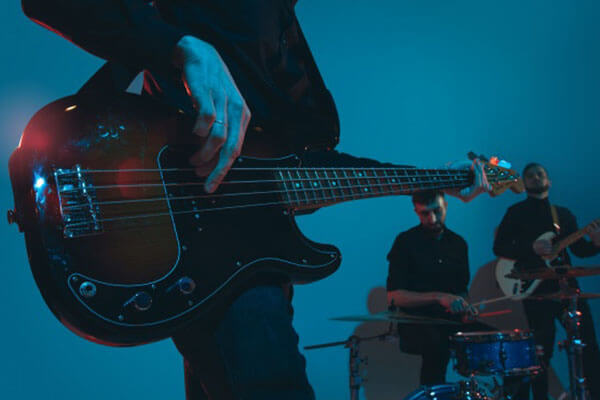
Most Sought-After Bassists: Musicians must always keep their performance simple. The goal is to always serve the song.
Take us into the songwriting world where Jon or someone in the band comes up with an idea, then how you start to contribute the bass line to a melody or lyric.
Sometimes, it comes to me when I hear the changes. Livin’ On A Prayer was one. Other ones, I’ll start simple, build upon it and then try to find out from either Jon, whoever’s producing that record or wherever co-wrote with Jon, try to imagine what they would want and they’ll tell me. In the past years, they wanted simple. A lot of times, I’ll hear, “That part’s too smart.” “I can play it simple if that’s going to get the job.” I’m much happier doing it that way anyway because I’m not a soloist. It’s just meat and potatoes.
What’s the difference between a top 40 song and a number 1 song from your perspective?
That’s where you get the big bucks. I would say advertising, promotion, channel audition, radio and all that stuff. There have been great top 40 songs that didn’t make it to number 1. It depends on the team that’s taking care of it. Once we record it, that’s all we can do, then it has to be sold.
Who is one of the most interesting artists that you’ve worked with? Bon Jovi is a pretty cool cat but besides Jon, who else in your memory was one of the most interesting, most talented artists that you’ve ever met and why?
You have to take personal responsibility for your life. You need to take action in everything.
Phoebe Snow. She was natural and wrote amazing songs. The recording sessions for her first album we enjoyed, plus we were all younger then so it was more about the great songs and her amazing singing. I got another session after this. It was for the joy at that point. Probably if I thought about it, Ringo was something else. He was cool. If I could be a fly on the wall, kept my eyes open but I tend to try to focus on the job at hand and not notice the stars in the room as they were.
Maybe that’s why you became so beloved and respected is because you came to work and made everybody else around you better.
I don’t know if that’s the case but that’s what you’re supposed to do. My son is a guitar player, singer-songwriter. Everybody told him, all the people that were higher-ups and people that could do something, “You have to surround yourself with people that played better than you do and that’ll raise you.” That is true.
Teach us about the process of deciding which songs make it on the album on the LP. You start with recording. What’s the process of choosing? How do you make it a number one song? What was the difference between a top 40? How many songs would you write and then record before you decide which ones you’re going to release?
There could be as many as 30 or more. Jon will keep writing with Richie or whoever. They’ll keep going until they have what they feel is enough to choose from. You bang them out, polish them up. Some make it, some don’t. As we’re figuring out what’s going to be a hit, Jon didn’t want to release Livin’ On A Prayer. He didn’t like it. Richie had to say to him, “Are you nuts?”
What’s your favorite Bon Jovi song?
The song is called Lie To Me, the These Days record. It’s more of a ballad. It’s good. For up songs, the usual Prayer and Keep The Faith, I love those. There’s a lot of them. I’m a fan also, those Slippery When Wet, New Jersey and These Days records. They’re great, especially the 2nd and 3rd albums, stuff with Prayer and the bigger hits.

Most Sought-After Bassists: When you go out on the field, you must understand that a champion is not always a champion. However, they have to be whenever it needs to be.
How do you keep a band glued together for so long when everybody has to have some ego or you wouldn’t be playing at the highest level in the world? What’s the secret to keeping a band together in checks and balance system so that it’s all about the music? They say in the entrance to the Sun Studios in Memphis, “It’s all about the music, stupid.”
Jon is the king of the castle. It’s his ball and bat. It’s making him happy and also making ourselves happy in the band with what we’re playing. When those two things come together, that’s perfection, as far as I’m concerned. If he’s smiling, the world is smiling. If he got to beat a song over the head too long, it becomes not fun. It’s stressful. If everything’s going smoothly and the ideas are going around, then that’s what makes it all worthwhile going in there and will eat yourself up.
Tell us how you met Jon Bon Jovi and how you became a part of the band. You play on his very first release back in the day. How did you meet him? How did he invite you to play on that first song?
He didn’t. Before I knew him, he was doing demos at his studio in New York called the Power Station. He was sweeping up his cousin on the Power Station and running errands for all the famous people that were in there working at the time and then he would do his demos when a studio was open. It could be anywhere from 2:00, 3:00 in the morning or whatever. I got called from someone named Lance Quinn, who I had played in a band with when I was younger and he was co-producing these demos.
He asked me to come in and do this. They would pick whoever was around at the time to come in and play. For example, Springsteen was in one of the studios. We got Roy Bittan from Bruce’s band, who played the keyboards. John Waite was doing his first solo record. We got the drummer, Penny Frankie, the rocker who has passed and a guitar player named Tim Pierce, who’s still one of the top studio guys in LA.
With the current state of the world, you do what you do and try to do it the best you can. If you are lucky and talented, you can make a living out of it.
That was the band Runaway. He did the demo and put a band together of local players from Jersey and thought that it was only going to be for 1 week or 2 to promote the song. We got signed with that song. That’s how I got involved with that and then I didn’t do anything until the first album had Runaway on it. The second album, 7,800, I didn’t have anything to do with that and then from Slippery on, I played on everything. In 1995, I started playing live with them.
Which one of the most memorable events that you played anywhere in the world? What stands out as one of your most exhilarating experiences on stage?
We did Hyde Park a few years ago in London. It was 90,000 or 100,000 people. One of the first things I played with them was in Wembley Stadium and it was being filmed for a DVD. It can only take in so much if you’re up there playing and concentrating. I couldn’t see all the people, but when I saw the DVD, it made an impression.
What do you say to a young man and woman who grows up in a family where the parents say, “No. Go to college. Get a real job. You can’t make it as a musician. Get your head out of the clouds?”
I didn’t say anything because that my mother was that way. My father’s going, “Listen to this. My kid played on this.” He loved that he passed away before any of that came to fruition. Is there a backup plan? There was a time when there was but the way the world is now, you do what you do and try to do it the best you can. If you’re lucky and talented, you’ll be able to make a living out of it. On my side, I go more for luck and less for talent. I pulled the wool over people’s eyes for a while. I’m happy with that.
That’s not your reputation. You are so well-respected in the whole industry.
It’s great. I’m not trying to do salsa modesty or anything but I don’t see myself that way. I’m embarrassed when I’m standing up on stage. It could be for 5 or 90,000 people, I have to fight my insecurities up there, play the songs and enjoy it. It’s a weird confluence. Every parent says that. I didn’t say that to my son because he wasn’t going to hear it. He was going to do it no matter what. He’s been pushing, got better, and it’s amazing.
We skipped right to your fame and fortune. Where did you grow up? How did you struggle through the music business that you did before you hit it big?
That’s weird because I don’t remember struggling. It wasn’t struggling to me, but interestingly enough, another story, when my dad passed away, I left the funeral early to drive to New York from Philly to play on an album by a guy named Steve Goodman, who wrote the song Riding On The City of New Orleans. He had a hit with it but the guy who was producing it was one of the greatest producers ever. The guy named Arif Mardin, who’s done everybody from Roberta Flack, Donny Hathaway, Bee Gees, Saturday Night Fever Bee Gees and everybody. The first time that I was in the New York Studio, that’s where I ended up.
I was playing in local bands in Philadelphia and my neighborhood. I’m playing clubs there and played with a guy named Buzzy Linhart who wrote (You Got to Have) Friends that Carly Simon had a hit with and these are ancient. I never hit my mother up for money because she didn’t have any. My dad was gone by then. I always seem to get by. I don’t know how or why because I wasn’t making much money.
You stay focused on your passion, keep practicing and preparing. That’s pretty extraordinary that even after all these years, you still have to practice. Going into the studio, how many hours do you still have to practice to be at your highest level, you’re A-game once the concert or the tour starts?
Practicing can be taken two ways. You can practice scales and all kinds of stuff to get your speed up. My practice is relearning whatever I recorded, have to go out and play live. It’s the same as when I first started playing. It hasn’t changed. I told my son and other players. They will say, “I play in a bar band and go to rehearsal.” I’m like, “Even if you record the songs, by the time you have to play them live, I don’t know about you but I can’t remember them, so then I get to sit here over and over and play the songs, play them again and then do it backward.” That’s my practicing.
How does that apply to the theme of this whole show? What you’re teaching us and reminding us about is that’s the secret to sales, leadership and parenting. It’s consistency. It’s trusting the predictability that when you go on tour, Jon Bon Jovi knows that you’re going to show up prepared with you’re A-game. You don’t have to waste precious time trying to get up to speed. You show up to speed. You don’t have to get ready. You stay ready.
I try to but I buy it, on the other hand, I don’t always stay ready because once COVID hit, I didn’t pick up an instrument. I didn’t even have the urge to and then something came up, so I held them out and learned the songs. I thought, “I’m not going to have to worry. I’m not going to be playing until 2021.” I’m lazy but I got to give my all when the time comes.
As a football player, when you go out on the field, we have to understand, especially as spectators, that a champion’s not always a champion but he has when he needs to be. We’ve talked about passion and preparation practice. I love quotes like, “Under pressure, you don’t rise to the occasion. You fall to the level of your training,” which means fresh and it’s not something that’s naturally there. It’s created. When you question your ability and you know what you’ve been trained to do, there’s never any pressure. That’s why we train and practice so hard. That’s what I’ve understood from every single answer.
Here’s the last question. There’s a famous university professor. He was battling cancer and coined the phrase, “Last lecture.” He recorded this speech mostly for his kids, who are young girls growing up, so that after he took his last breath, they would know what their dad wanted them to know. If you had one final speech or last lecture, what’s your message to the world as one of the finest musicians on the planet in one of the largest rock and roll bands in history, the rock and roll hall of fame, Bon Jovi teaches? When someone says, “What did Hugh McDonald represent,” we can put it in the hook and maybe I’ll write that song.
There’s the usual, “Buy low, sell high.” Everybody wears masks so we can get back to doing stuff. I can get back out there and play. We had a whole tour canceled and an album not released. It sounds horrible, maybe it’s because I’ve been watching the news 24/7 but we got to do something about this stuff. That’s the only words of wisdom that I can come up with.
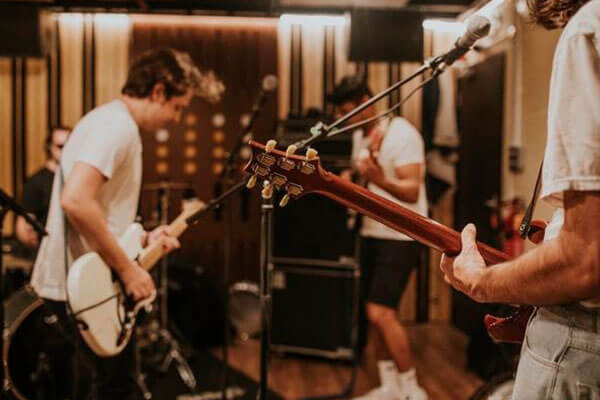
Most Sought-After Bassists: There is a difference between training to faith and training to win. There’s a difference between practicing to play and practicing to perform.
We all need to take personal responsibility for our lives and take action. We got to do what we can, when we can do it, pull out your bass and play the song.
I thought of it with practice. The other one is, “You don’t play it until you get it right. You play it so you don’t get it wrong.” You don’t have to think about it. You rehearse a ridiculous amount or try to the point where it gets boring. My mind has wandered at times on TV shows and my hand is luckily going to the right note. That’s what you have to be prepared for. The older you get, the more it happens, at least with me. I don’t know how the Stones do it. I got to talk to them. They rehearsed for a couple of months.
Even from an athlete’s perspective, there’s a difference between training to fight and to win, practicing to play and perform. I appreciate your wisdom. This is an honor to have you on the show. People are going to read and re-read because of your wisdom. I can’t wait to see you on tour again. Remember what Hugh McDonald from Bon Jovi has reminded us about this entire interview that when you finally decide to be a power player, the power play is in you. Until next time. Quantify your takeaway and go make a power play. You’re amazing. You’re one of my heroes. You’re a superb human being.
Thank you for inviting me to do this. It was a pleasure. I can’t wait to see you again in person.
We’ll make that happen.
Important Links:
About Hugh McDonald
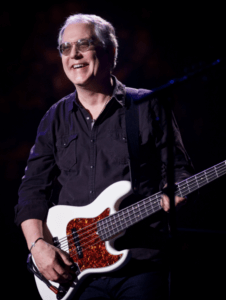 Hugh McDonald is a current bassist and backup singer for Bon Jovi. He has played with many other artists, both live and in the studio, and has recorded with Willie Nelson, Jon Bon Jovi, Richie Sambora, Steve Goodman, Ringo Starr, Lita Ford, Michael Bolton, Cher, Alice Cooper, Ricky Martin, Gavin Whittaker, Michael Bublé, Bret Michaels, others and did a few dates during Shania Twain’s the Woman in Me TV tour.
Hugh McDonald is a current bassist and backup singer for Bon Jovi. He has played with many other artists, both live and in the studio, and has recorded with Willie Nelson, Jon Bon Jovi, Richie Sambora, Steve Goodman, Ringo Starr, Lita Ford, Michael Bolton, Cher, Alice Cooper, Ricky Martin, Gavin Whittaker, Michael Bublé, Bret Michaels, others and did a few dates during Shania Twain’s the Woman in Me TV tour.
